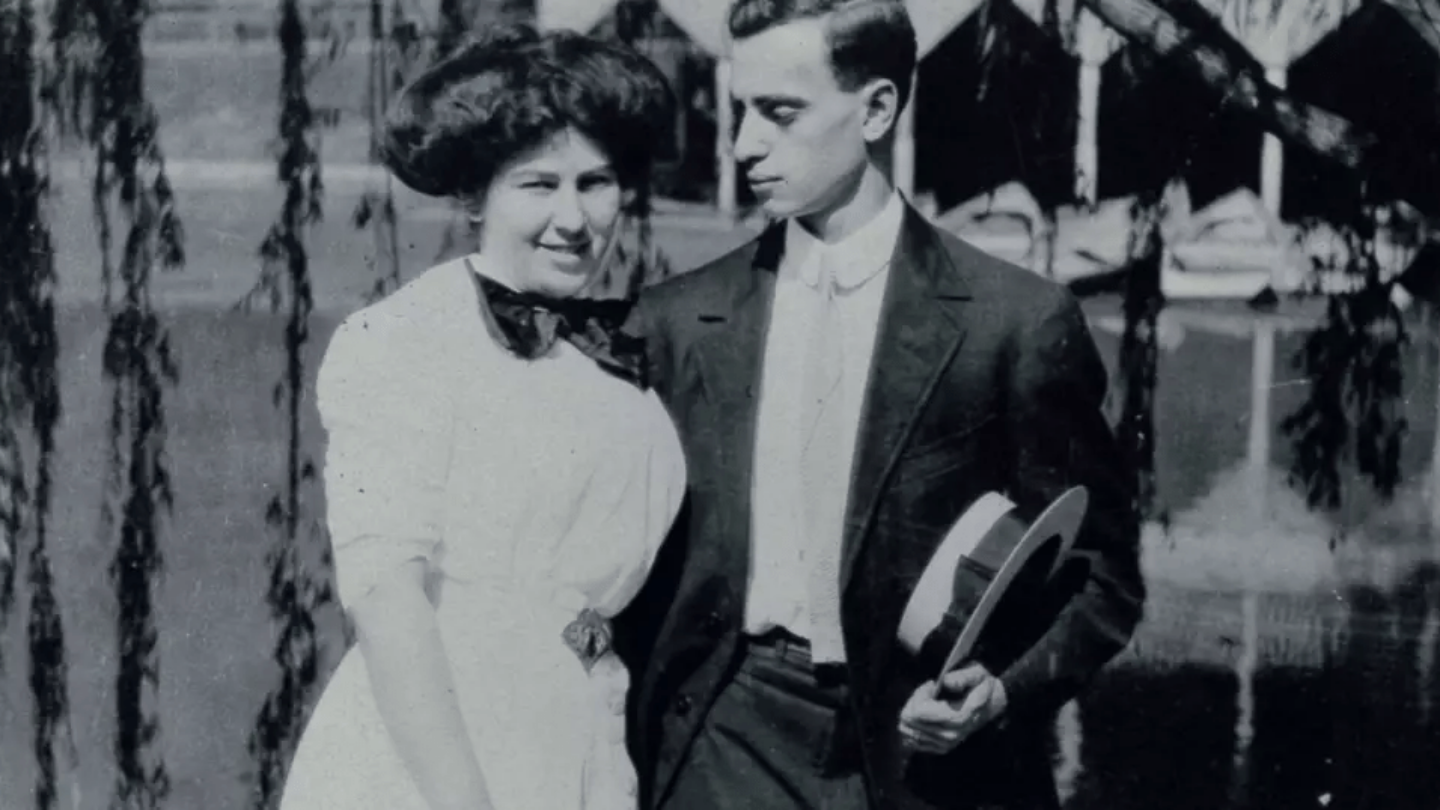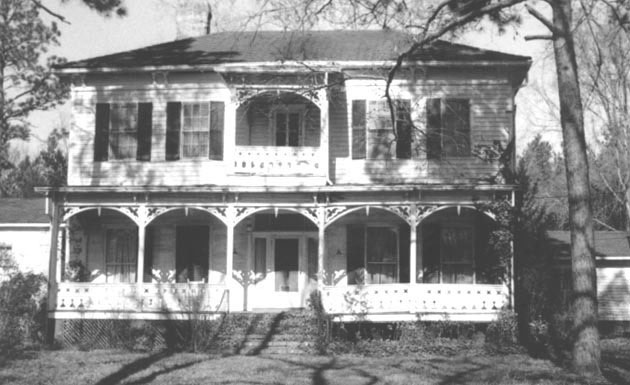
Lucille Selig Frank and Leo Frank in Grant Park, July 1909, courtesy of The Breman Museum, from the Maxine and Harold Marcus Family Papers Collection, MHM 96.014
Lucille Selig was born in Atlanta in 1888 to a prominent Jewish family. Her maternal grandfather, Levi Cohen, was the co-founder of the Temple, the city’s reform synagogue. Her uncle, Simon Selig, owned a thriving Atlanta business called West Disinfecting, where Lucille’s father worked. And other family relatives owned and operated successful clothing and department stores in Atlanta and Athens, Georgia.
Despite these family connections to wealth and prominence, Lucille Selig joined the work force after graduating from Atlanta’s Girl’s High School in 1906. Drawing on the secretarial skills she was taught in school, Lucille was employed first as a stenographer at the Jewish-owned Atlanta Paper Mills Company and later in a similar position at the regional offices of Swift Meats.
On November 30, 1910, Lucille Selig married Leo Frank, a factory superintendent from Brooklyn and a graduate of Cornell University. The wedding took place in the home of Lucille’s parents and was presided over by Dr. David Marx, the rabbi of the Temple. The first years of Lucille and Leo’s marriage were, by all accounts, happy and without incident. As Lucille later recalled “I suppose there are many husbands in the world as good as Leo, and it may be therefore that I am foolishly fond of him. But he is my husband, and I have the right to love him very much indeed and I do. If I make too much of him, perhaps it is because he has made too much of me.”
In 1913, however, Lucille and Leo Frank’s lives and marriage were forever changed when the body of a thirteen-year-old, white female employee named Mary Phagan, was discovered in the basement of the factory where Leo was superintendent and part owner.
Mary Phagan had been fired the week before her murder and had visited the factory to collect her final paycheck from Mr. Frank. Though not initially a suspect in the crime, Leo Frank was eventually arrested and charged with assault and murder, based largely on the frequently changing testimony of Jim Conley, a Black janitor at the factory. (This was one of the rare times in the early twentieth century South in which the testimony of an African American male was used to prosecute a white man.)
The trial that followed took place in a highly charged atmosphere marked by sensationalist press coverage and virulent antisemitism. Crowds of locals gathered outside the open windows of the courthouse to cheer on the prosecution of the Jewish factory manager. The judge, worried that an innocent verdict might incite the crowd to lynch Leo Frank, suggested that the defendant and his lawyers not be present when the verdict was announced. Amid loud chants of “Hang the Jew” from spectators, the jury met and in less than four hours pronounced Frank guilty. The judge sentenced him to death by hanging.
In the years following the verdict, Leo Frank’s lawyers filed multiple appeals, including three to the Supreme Court of Georgia and two more to the U.S. Supreme Court. When these appeals were exhausted, Frank’s attorneys sought a pardon from Georgia Governor John Slaton. After reviewing over 10,000 pages of court documents and touring the pencil factory where the murder had taken place, Slaton concluded that Frank was innocent and commuted his death sentence to life imprisonment. Frank was transported to the state prison farm at Milledgeville, Georgia to serve his sentence.
Leo Frank at his murder trial in a courtroom in Atlanta. Lucille is sitting behind him. Circa 1913, VIS 71, from the Floyd Jillson Photographs Collection, Kenan Research Center at Atlanta History Center.
Governor’s Slaton’s decision was applauded by many national publications and even some local newspapers (including the Atlanta Journal and the Atlanta Georgian), but his decision also enraged many white Georgians, leading to demonstrations in Atlanta and elsewhere in the state and the march of an estimated 5,000 angry protestors to the governor’s mansion. In response to these threats, Governor Slaton declared martial law and called out the National Guard to maintain peace. When his term as governor ended a few days later, Slaton and his wife left the state, not to return for a decade.
Despite the danger, violence, and constant threats that surrounded Leo Frank’s trial, his initial verdict, and the Governor’s commutation of his sentence, Lucille remained steadfast, unshaken and resolute in the defense of her husband against all charges and active in the push to have his sentence overturned. She was present and clearly visible in the courtroom sitting close by her husband during his trial and wearing nice clothes to ensure the jury saw that the man accused of such a heinous crime had a doting and loving wife who believed strongly in his innocence. Lucille also issued public statements to the newspapers denouncing charges and allegations made by the prosecution and its witnesses about Leo.
After the initial guilty verdict and throughout the appeals process, Lucille Frank continued to visit her husband in prison and managed his correspondence. She brought letters from friends, family, and strangers alike and made sure his responses were mailed out. She also wrote a letter to the Prison Commission as part of the campaign to commute her husband’s sentence—and she managed Leo’s finances while he was imprisoned and sent him money and supplies to improve his living conditions at the Milledgeville prison farm.

Home of Roy Alford in Milledgeville, Georgia where Lucille Frank stayed when she visited her husband Leo Frank in prison, courtesy of The Breman Museum, WBJ 635.038
During his first week at the prison farm, Lucille wrote her husband to say:
“Everyone is so happy that you are going to have the chance that we have prayed for to prove your innocence to all the ‘doubting Thomasses.’ Of course the world as a whole knows you are guiltless, but you must be vindicated.”
Leo’s correspondence indicates that he shared this vision and looked forward to the possibility of proving his innocence and winning his freedom.
But even in the relative security of the prison farm, his life was still in grave danger. On the evening of July 17, 1915, hours after spending time in conversation with his wife, Leo Frank was brutally stabbed while sleeping in his bunk by a prisoner and convicted murderer named William Creen. Frank miraculously survived his near-fatal stabbing. But one month later, a group of 25 prominent men from Marietta, Georgia, (the hometown of Mary Phagan), who called themselves the Knights of Mary Phagan, stormed the prison hospital where Frank was recovering, kidnapped him, and drove him more than 100 miles back to Marietta where they hanged him from an oak tree.
Lucille was extremely distraught when she learned of her husband’s kidnapping and lynching. Despite not sleeping at all for more than two days after receiving the news, she once again shouldered the responsibility of managing her late husband’s affairs—settling accounts with merchants, responding to telegrams of condolences, arranging for Leo’s belongings to be collected from the prison farm, and planning his funeral. Determined that Leo would not be buried in the same state that had contributed to his brutal death, Lucille made the arrangements to take Leo’s body up to New York for burial at the Mount Caramel Cemetery.
Lucille Selig Frank, circa 1910, VIS 71, from the Floyd Jillson Photographs Collection, Kenan Research Center at Atlanta History Center
Lucille Frank made only one public statement regarding her husband’s lynching, and it was published in the Augusta Chronicle on October 1, 1915 (six weeks after the lynching):
“I am a Georgia girl, born and reared in this state, and educated in her schools. I am a Jewess; some will throw that in my face, I know, but I have no apologies to make for my religion. I am also a Georgian, an American, and I do not apologize for that, either. … I only pray that those who destroyed Leo’s life will realize the truth before they meet their God—they perhaps are not entirely to blame, fed as they were on lies unspeakable, their passions aroused by designing persons. Some of them, I am sure, did not realize the horror of their act. But those who inspired these men to this awful act, what of them? Will not their consciences make for them a hell on earth, and will not their associates, in their hearts, despise them?”
In time, Lucille stopped speaking publicly or privately about Leo and became more withdrawn and depressed because of the events she had experienced surrounding her husband’s trial and murder. She was only 27 when Leo Frank died, but she never remarried and supported herself by working as a sales clerk in various stores. According to friends, she continued to sign her name as “Mrs. Leo Frank,” and they believe that she never stopped mourning for her husband. It was also revealed after her death that Mrs. Frank had continued writing private letters to her husband after he died.
Lucille Selig Frank died on April 23, 1957 from heart disease, forty-two years after her husband’s murder. As she requested, her body was cremated, and her ashes were buried in Oakland Cemetery between the headstones of her parents, Emil Selig and Josephine Cohen Selig.
Lucille Frank did not live long enough to see justice for Leo Frank and his wrongful death at hands of a violent mob. But in 1982, Alonzo Mann, who had been an office boy at the pencil factory in 1913 where Mary Phagan was murdered, revealed that he had seen Jim Conley (the janitor) carrying the dead body of Phagan to the basement the day she died. Threatened with death by Conley if he ever talked and urged by his mother to keep silent, Mann was never questioned by the police and had never told anyone else about what he witnessed. In 1986, the Georgia State Board of Pardons and Paroles finally granted Leo Frank a posthumous pardon—not because they found him innocent of the crimes he was accused of, but instead because his lynching deprived Frank of his right to further appeal.


